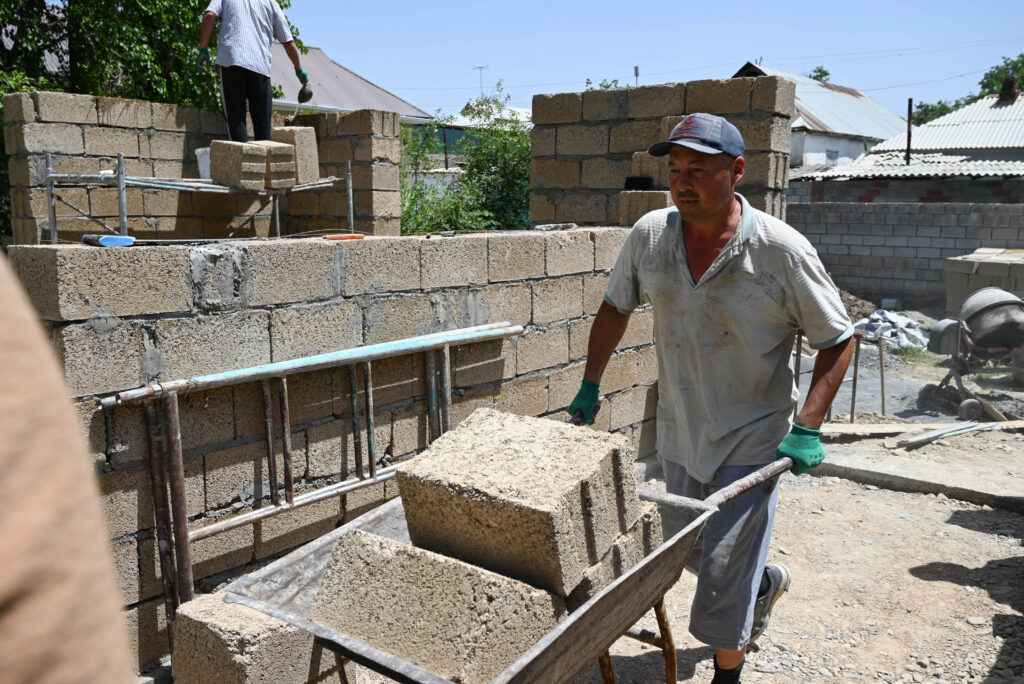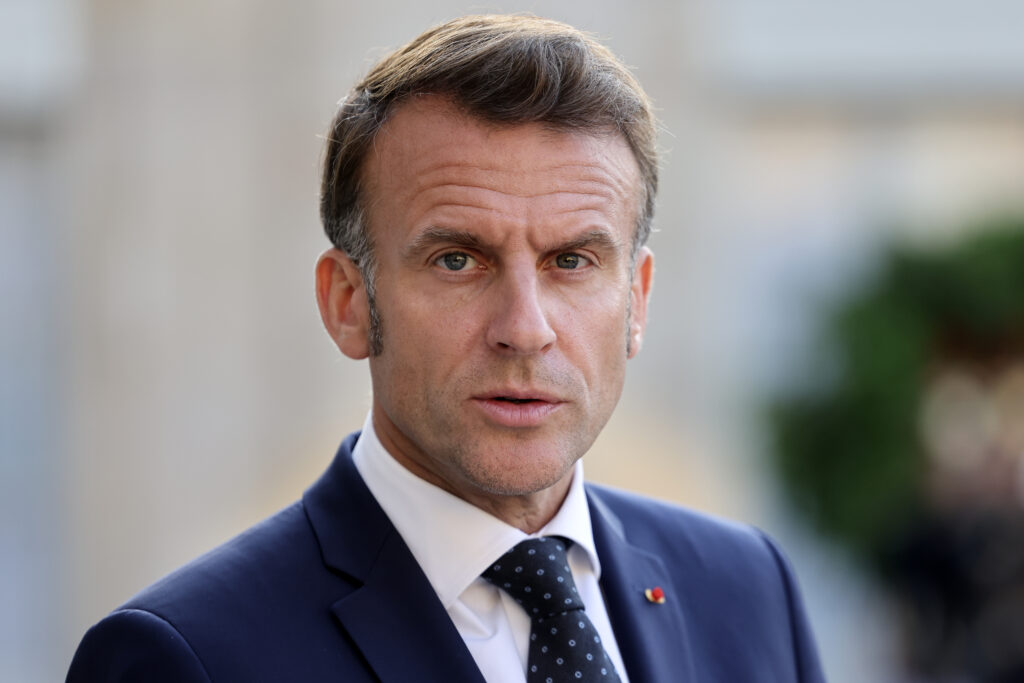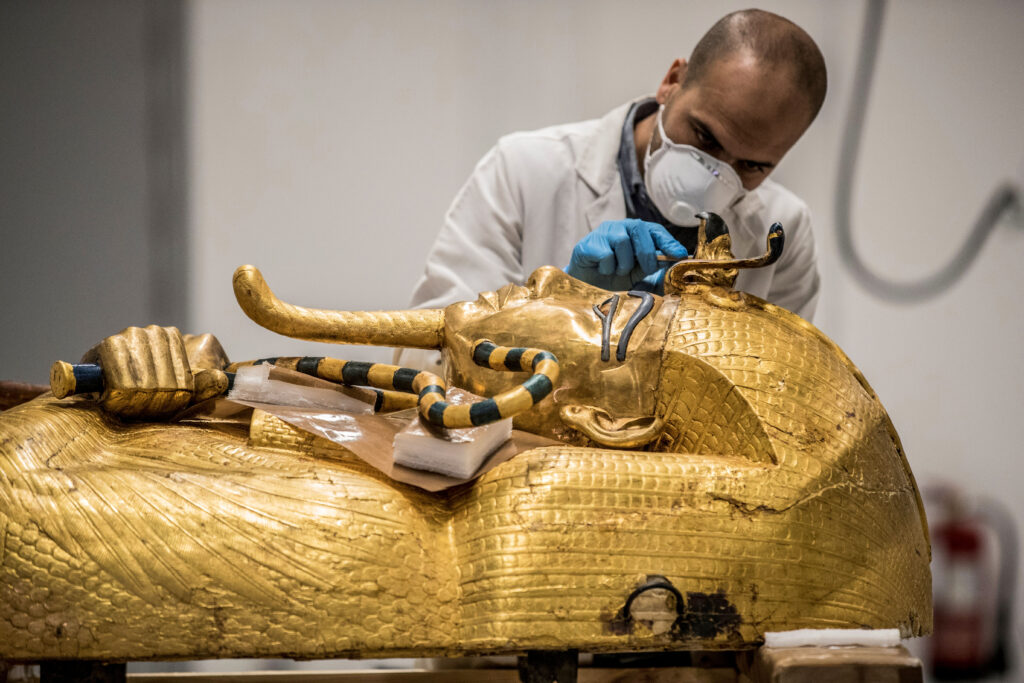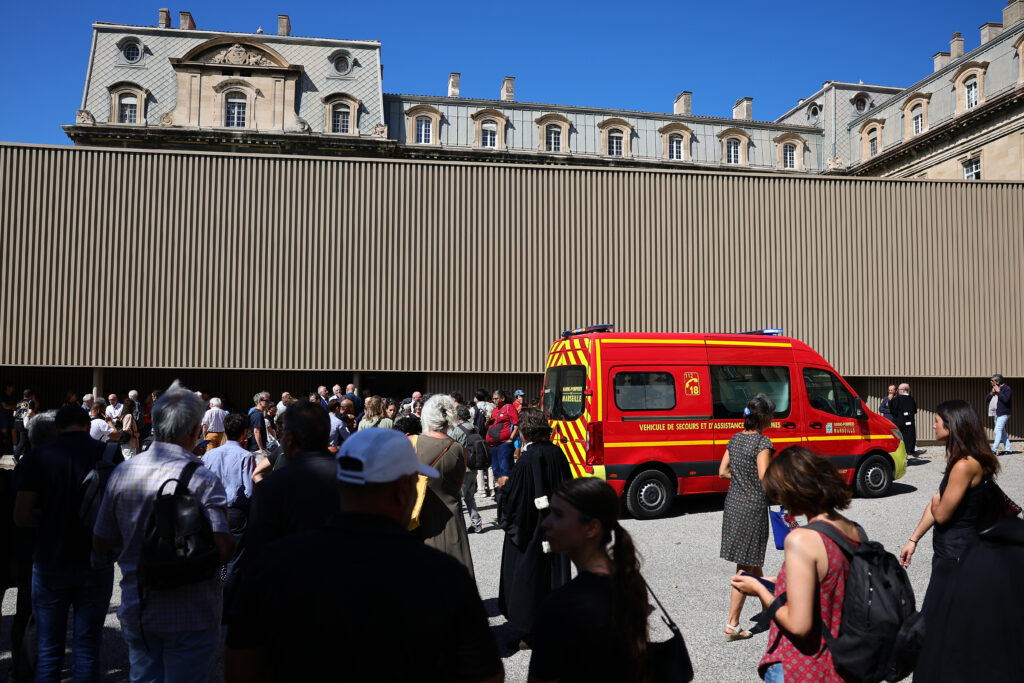Wiaan Mulder: slow ascent to Test cricket’s batting heightsMon, 07 Jul 2025 12:34:56 GMT
Wiaan Mulder, who stopped short on Monday of attempting to break the record for the highest score in Test history, had an inauspicious start to his Test career.Mulder made 367 not out for South Africa in the second Test against Zimbabwe at the Queens Sports Club before deciding –- in his first match as captain –- to …
Wiaan Mulder: slow ascent to Test cricket’s batting heightsMon, 07 Jul 2025 12:34:56 GMT Read More »
Au Kirghizstan, l’apparition de maisons en riz, écologiques et économiques
Dans son jardin, Akmatbek Ouraïmov observe les maçons qui bâtissent sa future maison. Un chantier ordinaire, si ce n’est le matériau de construction: des parpaings en riz, composant écologique et économique qui gagne en popularité au Kirghizstan.”J’ai choisi ceux en riz après avoir réfléchi à d’autres variantes: c’est pratique pour la chaleur, les finances et la construction”, assure cet habitant de Kyzyl-Kia, dans le sud de ce pays d’Asie centrale.Avant de se décider, Akmatbek Ouraïmov a d’abord “vérifié de ses propres yeux” ce matériau appelé “balle de riz”, obtenu après séparation de la céréale et de son enveloppe.”Je n’ai aucun doute sur la qualité. Les gens ne connaissaient pas, mais en voyant le chantier, ils s’y intéressent et m’appellent”, dit-il à l’AFP.Cette technique de construction comme alternative au ciment éveille désormais l’intérêt de scientifiques de tous les continents.Dans plusieurs études universitaires récentes -en Chine, Inde, Espagne ou sur les continents africains et sud-américains- les experts soulignent les propriétés énergétiques, économiques, physiques et environnementales du riz, pour répondre aux défis climatiques.L’usage de balles de riz permet, par exemple, d’avoir moins recours au ciment, gourmand en eau et responsable d’environ 8 % des émissions mondiales de CO2, selon les chiffres de 2023 du forum économique mondial. – Isolation -Habitant un village d’une région montagneuse et aride, Ykhval Borieva a elle aussi opté pour le riz, dont elle loue les propriétés isolantes, démontrées par les scientifiques.Grâce à la faible conductivité thermique du riz, sa maison reste “chaude en hiver et fraîche au printemps”.”On économise du charbon. Les murs gardent bien la chaleur et la fraîcheur”, se félicite-t-elle.Ces maisons ont vu le jour grâce à l’ingéniosité de Noursoultan Taabaldyev, l’un des précurseurs de ce procédé en Asie centrale.”Cette idée m’est venue enfant, en faisant de la menuiserie avec mon père”, explique l’ingénieux Noursoultan, qui n’a pas attendu de lire des études scientifiques pour se lancer.A 27 ans, il a déjà construit “300 maisons” en cinq ans, d’abord avec de la sciure de bois, puis avec du riz.Les briques sont “composées à 60% de balles de riz, le reste étant de l’argile, du ciment et une colle sans produits chimiques”, montre-t-il à l’AFP. Dans son atelier artisanal où s’envole la poussière de riz, des ouvriers se protégeant le visage compressent les briques, courent les faire sécher et aide des clients à les charger.Sèches, elles seront aussi solides que du ciment grâce à la silice, un oxyde minéral. Et côté sécurité incendie, un responsable régional du ministère des Situations d’urgence a indiqué à l’AFP ne voir “aucun danger particulier avec ces maisons”.- “Problèmes environnementaux” -Pour Noursoultan, la matière première est à portée de main: la région de Batken, où il vit, produit un tiers du riz kirghiz.”Les déchets de riz sont jetés dans les champs, se consument lentement, nuisent à l’environnement et ne sont pas utilisés comme engrais. Nous avons donc décidé de les recycler”, explique l’entrepreneur.Ce problème se pose encore plus sérieusement chez les gros producteurs de riz comme l’Inde, où “31,4 millions de tonnes de balles de riz remplissent les décharges et causent des problèmes environnementaux”, d’après une étude de novembre 2024, publiée par la société d’éditions scientifiques Springer Nature.”Les paysans sont ravis que nous emportions les déchets de riz car leur accumulation créé un risque d’incendie” dans les granges en cas de mauvaise ventilation, poursuit Noursoultan.Comme chez le fermier Abdimamat Saparov, qui montre les monticules.”Après avoir récolté et séché le riz, il reste environ 40% de déchets que nous n’avons aucun moyen de traiter”, dit M. Saparov, situation symptomatique de “l’absence d’atelier organisé de transformation” dans le secteur du riz, selon les autorités.Cette abondance de riz rend ces briques moins chères que celles en ciment, argument crucial dans le sud du Kirghizstan où le salaire moyen mensuel avoisine les 200 euros.D’autant que le ciment au Kirghizstan est le plus onéreux d’Asie centrale et pourrait être inscrit sur la liste des produits socialement sensibles, comme le pain ou l’huile, pour en contrôler les prix.Désormais, Noursoultan rêve d’automatiser la production pour se lancer à l’international et réaliser d’autres projets.”Je veux aller au Kazakhstan pour faire des briques avec des roseaux et de la paille broyés”.
Au Kirghizstan, l’apparition de maisons en riz, écologiques et économiques
Dans son jardin, Akmatbek Ouraïmov observe les maçons qui bâtissent sa future maison. Un chantier ordinaire, si ce n’est le matériau de construction: des parpaings en riz, composant écologique et économique qui gagne en popularité au Kirghizstan.”J’ai choisi ceux en riz après avoir réfléchi à d’autres variantes: c’est pratique pour la chaleur, les finances et la construction”, assure cet habitant de Kyzyl-Kia, dans le sud de ce pays d’Asie centrale.Avant de se décider, Akmatbek Ouraïmov a d’abord “vérifié de ses propres yeux” ce matériau appelé “balle de riz”, obtenu après séparation de la céréale et de son enveloppe.”Je n’ai aucun doute sur la qualité. Les gens ne connaissaient pas, mais en voyant le chantier, ils s’y intéressent et m’appellent”, dit-il à l’AFP.Cette technique de construction comme alternative au ciment éveille désormais l’intérêt de scientifiques de tous les continents.Dans plusieurs études universitaires récentes -en Chine, Inde, Espagne ou sur les continents africains et sud-américains- les experts soulignent les propriétés énergétiques, économiques, physiques et environnementales du riz, pour répondre aux défis climatiques.L’usage de balles de riz permet, par exemple, d’avoir moins recours au ciment, gourmand en eau et responsable d’environ 8 % des émissions mondiales de CO2, selon les chiffres de 2023 du forum économique mondial. – Isolation -Habitant un village d’une région montagneuse et aride, Ykhval Borieva a elle aussi opté pour le riz, dont elle loue les propriétés isolantes, démontrées par les scientifiques.Grâce à la faible conductivité thermique du riz, sa maison reste “chaude en hiver et fraîche au printemps”.”On économise du charbon. Les murs gardent bien la chaleur et la fraîcheur”, se félicite-t-elle.Ces maisons ont vu le jour grâce à l’ingéniosité de Noursoultan Taabaldyev, l’un des précurseurs de ce procédé en Asie centrale.”Cette idée m’est venue enfant, en faisant de la menuiserie avec mon père”, explique l’ingénieux Noursoultan, qui n’a pas attendu de lire des études scientifiques pour se lancer.A 27 ans, il a déjà construit “300 maisons” en cinq ans, d’abord avec de la sciure de bois, puis avec du riz.Les briques sont “composées à 60% de balles de riz, le reste étant de l’argile, du ciment et une colle sans produits chimiques”, montre-t-il à l’AFP. Dans son atelier artisanal où s’envole la poussière de riz, des ouvriers se protégeant le visage compressent les briques, courent les faire sécher et aide des clients à les charger.Sèches, elles seront aussi solides que du ciment grâce à la silice, un oxyde minéral. Et côté sécurité incendie, un responsable régional du ministère des Situations d’urgence a indiqué à l’AFP ne voir “aucun danger particulier avec ces maisons”.- “Problèmes environnementaux” -Pour Noursoultan, la matière première est à portée de main: la région de Batken, où il vit, produit un tiers du riz kirghiz.”Les déchets de riz sont jetés dans les champs, se consument lentement, nuisent à l’environnement et ne sont pas utilisés comme engrais. Nous avons donc décidé de les recycler”, explique l’entrepreneur.Ce problème se pose encore plus sérieusement chez les gros producteurs de riz comme l’Inde, où “31,4 millions de tonnes de balles de riz remplissent les décharges et causent des problèmes environnementaux”, d’après une étude de novembre 2024, publiée par la société d’éditions scientifiques Springer Nature.”Les paysans sont ravis que nous emportions les déchets de riz car leur accumulation créé un risque d’incendie” dans les granges en cas de mauvaise ventilation, poursuit Noursoultan.Comme chez le fermier Abdimamat Saparov, qui montre les monticules.”Après avoir récolté et séché le riz, il reste environ 40% de déchets que nous n’avons aucun moyen de traiter”, dit M. Saparov, situation symptomatique de “l’absence d’atelier organisé de transformation” dans le secteur du riz, selon les autorités.Cette abondance de riz rend ces briques moins chères que celles en ciment, argument crucial dans le sud du Kirghizstan où le salaire moyen mensuel avoisine les 200 euros.D’autant que le ciment au Kirghizstan est le plus onéreux d’Asie centrale et pourrait être inscrit sur la liste des produits socialement sensibles, comme le pain ou l’huile, pour en contrôler les prix.Désormais, Noursoultan rêve d’automatiser la production pour se lancer à l’international et réaliser d’autres projets.”Je veux aller au Kazakhstan pour faire des briques avec des roseaux et de la paille broyés”.
Nouveau conseil de défense sur “l’entrisme” des Frères musulmans
Emmanuel Macron a convoqué lundi un nouveau conseil de défense sur “l’entrisme” des Frères musulmans, après une première réunion fin mai jugée insatisfaisante par le chef de l’Etat, qui avait demandé au gouvernement “de nouvelles propositions”.Ce conseil de défense et de sécurité nationale se tiendra lundi en fin de matinée à l’Elysée, a indiqué l’entourage du président à l’AFP, confirmant une information du Figaro, sans autre précision.D’après le quotidien, y sont attendus le ministre de l’Intérieur Bruno Retailleau, sa collègue de l’Education Elisabeth Borne, mais aussi celle des Sports Marie Barsacq.Le précédent conseil de défense consacré à “l’entrisme” des Frères musulmans avait tourné au recadrage, M. Macron s’étant agacé que le rapport qu’il avait commandé sur le sujet ait fuité dans la presse avant cette réunion.”Compte tenu de l’importance du sujet et de la gravité des faits établis, il a demandé au gouvernement de formuler de nouvelles propositions”, s’était alors contenté d’indiquer l’Elysée.Le rapport faisait état d’une “menace pour la cohésion nationale” avec le développement d’un islamisme “par le bas” de la part des Frères musulmans.Née en 1928 en Egypte, la confrérie des Frères musulmans porte le projet d’un islam politique conservateur. Le mouvement a été interdit dans plusieurs pays, comme l’Arabie saoudite, l’Egypte et plus récemment la Jordanie.En France, il existe “dans certains quartiers” des phénomènes d’entrisme “identifiés”, avait affirmé M. Macron dans la foulée du premier conseil de défense, tout en appelant à ne pas “penser qu’il y en a partout, parce que ça peut rendre complotiste ou paranoïaque”.C’est précisément ce que lui reproche à gauche La France insoumise, dont le coordinateur national Manuel Bompard a encore dénoncé lundi sur TF1 une volonté de “pointer du doigt les Français de confession musulmane”.En pratique, les pistes avancées par M. Retailleau pour “s’attaquer aux écosystèmes islamistes” ont principalement pris la forme d’une réorganisation administrative, avec la création d’un rôle de “chef de file” en matière de renseignement, ou encore d’un “parquet administratif” capable par exemple de prononcer des dissolutions.Des “mesurettes administratives” rejetées en bloc par la cheffe de file du Rassemblement national, Marine Le Pen, qui avait réclamé d’aller “chercher, dénoncer, débusquer, couper les financements, interdire les publications” de cette “idéologie totalitaire”.Les décisions actées par ce nouveau conseil de défense pourraient faire l’objet d’un communiqué, a fait savoir l’Elysée.
Nouveau conseil de défense sur “l’entrisme” des Frères musulmans
Emmanuel Macron a convoqué lundi un nouveau conseil de défense sur “l’entrisme” des Frères musulmans, après une première réunion fin mai jugée insatisfaisante par le chef de l’Etat, qui avait demandé au gouvernement “de nouvelles propositions”.Ce conseil de défense et de sécurité nationale se tiendra lundi en fin de matinée à l’Elysée, a indiqué l’entourage du président à l’AFP, confirmant une information du Figaro, sans autre précision.D’après le quotidien, y sont attendus le ministre de l’Intérieur Bruno Retailleau, sa collègue de l’Education Elisabeth Borne, mais aussi celle des Sports Marie Barsacq.Le précédent conseil de défense consacré à “l’entrisme” des Frères musulmans avait tourné au recadrage, M. Macron s’étant agacé que le rapport qu’il avait commandé sur le sujet ait fuité dans la presse avant cette réunion.”Compte tenu de l’importance du sujet et de la gravité des faits établis, il a demandé au gouvernement de formuler de nouvelles propositions”, s’était alors contenté d’indiquer l’Elysée.Le rapport faisait état d’une “menace pour la cohésion nationale” avec le développement d’un islamisme “par le bas” de la part des Frères musulmans.Née en 1928 en Egypte, la confrérie des Frères musulmans porte le projet d’un islam politique conservateur. Le mouvement a été interdit dans plusieurs pays, comme l’Arabie saoudite, l’Egypte et plus récemment la Jordanie.En France, il existe “dans certains quartiers” des phénomènes d’entrisme “identifiés”, avait affirmé M. Macron dans la foulée du premier conseil de défense, tout en appelant à ne pas “penser qu’il y en a partout, parce que ça peut rendre complotiste ou paranoïaque”.C’est précisément ce que lui reproche à gauche La France insoumise, dont le coordinateur national Manuel Bompard a encore dénoncé lundi sur TF1 une volonté de “pointer du doigt les Français de confession musulmane”.En pratique, les pistes avancées par M. Retailleau pour “s’attaquer aux écosystèmes islamistes” ont principalement pris la forme d’une réorganisation administrative, avec la création d’un rôle de “chef de file” en matière de renseignement, ou encore d’un “parquet administratif” capable par exemple de prononcer des dissolutions.Des “mesurettes administratives” rejetées en bloc par la cheffe de file du Rassemblement national, Marine Le Pen, qui avait réclamé d’aller “chercher, dénoncer, débusquer, couper les financements, interdire les publications” de cette “idéologie totalitaire”.Les décisions actées par ce nouveau conseil de défense pourraient faire l’objet d’un communiqué, a fait savoir l’Elysée.
Le patient travail des restaurateurs égyptiens sur les trésors de Toutânkhamon
Adolescent, Eid Mertah passait des heures à lire des livres consacrés au roi Toutânkhamon, traçant les hiéroglyphes du doigt, rêvant de tenir un jour entre ses mains le célèbre masque d’or du jeune pharaon.Il fait aujourd’hui partie des 150 restaurateurs professionnels égyptiens qui travaillent dans les laboratoires de conservation du Grand musée égyptien (GEM) et traitent, entre autres, la précieuse collection d’objets funéraires découverte en 1922 dans une tombe de la vallée des Rois épargnée par les pillards.”C’est grâce à Toutânkhamon que j’ai choisi d’étudier l’archéologie”, confie à l’AFP cet expert de 36 ans. “Je rêvais de travailler sur ses trésors — et ce rêve s’est réalisé”.Le public devra patienter encore quelques mois pour découvrir le fruit de son travail: à l’origine prévue le 3 juillet, l’inauguration officielle du GEM et de l’exposition permanente réunissant pour la première fois les quelque 5.000 objets du trésor de Toutânkhamon, a été reportée à la fin de l’année. Après plusieurs reports liés aux bouleversements politiques et à la pandémie de Covid-19, les autorités égyptiennes ont expliqué ce nouveau délai par les tensions géopolitiques dans la région. “Je pense que nous sommes plus impatients de découvrir le musée que les touristes eux-mêmes”, raconte Mohamed Moustafa, un restaurateur lui aussi âgé de 36 ans.Le bâtiment ultramoderne construit à proximité des pyramides de Gizeh pour un budget de plus d’un milliard de dollars offrira aux visiteurs une expérience rare: observer derrière une paroi vitrée la vie d’un laboratoire de conservation et le travail des experts sur le bateau solaire du pharaon Khéops, vieux de 4.500 ans, selon les informations obtenues auprès de la direction du musée.”Lorsque les visiteurs parcourront le musée, ils admireront la beauté de ces artefacts. Mais pour nous, chaque pièce est le rappel d’heures innombrables de travail, des débats passionnés et des formations intensives”, explique Mohamed Moustafa.Le trésor de Toutânkhamon comprend son emblématique masque funéraire en or, des cercueils dorés, des amulettes en or, des colliers de perles, des gants en lin, des statues, des sanctuaires miniatures, des chars cérémoniels, ainsi que deux fœtus momifiés, présumés être ses filles mort-nées.Nombre de ces objets n’avaient pas été restaurés depuis leur découverte par l’archéologue britannique Howard Carter. Les techniques de conservation employées à l’époque visaient à protéger les objets, mais plus d’un siècle plus tard compliquent leur restauration.- “Immense puzzle”-L’application de cire sur les surfaces en or a permis “de préserver les objets à l’époque”, explique Hind Bayyoumi, “mais elle a ensuite masqué les détails que nous souhaitons aujourd’hui révéler au monde”.Pendant plusieurs mois, cette professionnelle de 39 ans et ses collègues ont minutieusement retiré la cire qui avait, au fil du temps, emprisonné la saleté et terni l’éclat de l’or.La restauration a été le fruit d’une coopération étroite entre l’Egypte et le Japon, Tokyo apportant un financement de 800 millions de dollars sous forme de prêts ainsi qu’un soutien technique pour la restauration, le transport et la gestion muséale.Les restaurateurs égyptiens, formés pour beaucoup par des experts japonais, ont conduit leurs travaux de pointe dans dix-neuf laboratoires spécialisés – bois, métal, papyrus, textile…La restauration du cercueil de Toutânkhamon – transféré directement depuis sa tombe – s’est révélée une des opérations les plus délicates. Au laboratoire du bois, la restauratrice Fatma Magdy, 34 ans, a mobilisé loupes et archives photographiques pour réassembler avec soin les fines feuilles d’or.”C’était comme reconstituer un immense puzzle”, confie-t-elle. “La forme des cassures, le tracé des hiéroglyphes — chaque détail comptait.”- “Strict minimum” -La collection Toutânkhamon a longtemps été éparpillée dans plusieurs sites, notamment le Musée égyptien de la place Tahrir, le musée de Louxor, ainsi que la tombe elle-même, dans la Vallée des Rois. Certains objets ont fait l’objet d’une restauration légère avant leur transfert pour un transport sécurisé.Avant toute manipulation, les équipes ont procédé à une documentation photographique, à des analyses aux rayons X et à différents tests pour évaluer l’état de chaque pièce”Nous devions comprendre l’état de chaque objet — les couches d’or, les adhésifs, la structure du bois — absolument tout”, explique M. Mertah, qui a travaillé sur les sanctuaires cérémoniels du jeune pharaon au Musée de la place Tahrir.La philosophie qui a guidé l’équipe tout au long du processus est de “faire le strict minimum nécessaire – tout en respectant l’histoire de l’objet”, explique Mohamed Moustafa. “Chaque objet raconte une histoire”.
Effondrements rue d’Aubagne à Marseille : prison ferme pour des copropriétaires, sursis pour l’élu et l’expert
Symbole du fléau du logement indigne à Marseille, le procès des effondrements mortels de la rue d’Aubagne s’est soldé lundi par de la prison ferme, sous bracelet électronique, pour trois copropriétaires et du sursis pour l’architecte-expert et l’ex-adjoint au maire mis en cause.Ce jugement, rendu plus de six mois après le procès, était attendu par toute une ville, traumatisée par ces effondrements de deux immeubles, le 5 novembre 2018, au coeur de Marseille, dont le 65 rue d’Aubagne, où huit locataires avaient perdu la vie.Parmi les 16 prévenus à ce dossier, dix au total ont finalement été condamnés, dont trois seulement à de la prison ferme, trois copropriétaires du 65.La peine la plus sévère, de quatre ans de prison dont deux ans ferme à effectuer sous bracelet électronique, a été infligée à Xavier Cachard, alors élu au conseil régional Paca, coupable, avec le syndic de l’immeuble, des “fautes les plus graves” dans ce dossier, a estimé le tribunal correctionnel.En tant que copropriétaire mais aussi avocat du syndic, il a adopté “une stratégie d’obtruction de réalisation des travaux nécessaires” dans l’immeuble, avec une “emprise manifeste sur les décisions et les votes”, sans parler de son “indifférence déplorable” sur l’état du logement qu’il louait, a asséné le président du tribunal correctionnel de Marseille, Pascal Gand.Juste avant que soit abordé le cas de Xavier Cachard, l’audience avait été interrompue près de 40 minutes après le malaise d’un autre copropriétaire, qui s’est effondré à l’énoncé de sa culpabilité. – “Téléprison” -Alors que le président énumérait les nombreux travaux – risques d’effondrement du plafond et du plancher, fils électriques apparents, déficit de chauffage, moisissures, punaises de lits – que Sébastien Ardilly aurait dû entreprendre, avec ses parents, dans le logement qu’ils louaient à une famille comorienne, dont un enfant de huit ans, le prévenu s’était effondré, nécessitant l’intervention des marins-pompiers.Sébastien Ardilly a finalement été condamné à trois ans de prison donc un an ferme, sous bracelet électronique, son père Gilbert écopant lui de de la même peine que M. Cachard. Des amendes importantes ont également été prononcées, jusqu’à 100.000 euros contre le cabinet Liautard, syndic du 65 rue d’Aubagne.Le tribunal a donc largement suivi les parties civiles, qui avaient directement cité à comparaître les copropriétaires du 65 rue d’Aubagne, le seul immeuble habité lors du drame, après que ceux-ci avaient été épargnés par l’instruction. Pour les prévenus qui avaient été poursuivis par les magistrats instructeurs, le tribunal s’est au contraire montré plus clément, prononçant uniquement des peines de prison avec sursis, et ce notamment contre le seul élu mis en cause dans ce dossier, Julien Ruas.Alors adjoint au maire de Jean-Claude Gaudin, maire LR de la ville de 1995 à 2020, et chargé notamment du logement insalubre, il a été condamné à deux ans de prison avec sursis et une interdiction d’exercer une fonction publique pendant cinq ans. “Vous ne vous êtes aucunement mobilisé pour mettre en place une politique volontariste de lutte contre les immeubles en péril”, a estimé le président.L’architecte Richard Carta, qui avait qui avait bâclé une visite de l’immeuble quelques jours à peine avant le drame, laissant aussitôt les habitants réintégrer leurs appartements, a eu la même peine, assortie d’une interdiction définitive d’exercer ce métier.- “Téléprison” -En sortant de l’audience, des habitants de Marseille, venus en nombre écouter cette décision dans une ville minée par le logement indigne, ont crié “assassins” quand les principaux prévenus sont passés devant eux.”C’est un jugement qui est quand même assez clément (…), on attendait quand même plus. Et effectivement, on est encore sous le choc”, a réagi Anissa Harbaoui, coprésidente de l’Assemblée des délogés, regrettant qu’il n’y ait “aucune peine de prison ferme” et assimilant les peines sous bracelet électronique à du sursis.”C’est de la téléprison”, a dénoncé un autre membre de l’Assemblée des délogés, Stéphane Lécolier, en comparant ces peines à du “télétravail”.Les six semaines de débats à l’automne avaient permis d’établir que les effondrements le 5 novembre 2018 des numéros 63 (vide) et 65 étaient inéluctables, vu l’état du bâti. Mais l’instruction avait seulement renvoyé quatre personnes devant le tribunal : Julien Ruas, Richard Carta, et deux personnes morales, le syndic du 65, le cabinet Liautard, et Marseille Habitat, bailleur social de la ville de Marseille propriétaire du numéro 63, laissé à l’état de ruine.Insuffisant pour certaines parties civiles qui avaient donc cité à comparaître 12 personnes supplémentaires, dont plusieurs copropriétaires.Au final, 16 personnes morales et physiques ont donc été jugées, pour différents délits, notamment homicide involontaire par violation manifestement délibérée d’une obligation de sécurité, un délit punissable de cinq ans de prison maximum, et soumission de personnes vulnérables dont au moins un mineur à des conditions d’hébergement indigne, des faits qui peuvent valoir jusqu’à dix ans d’emprisonnement.Durant les débats, les prévenus avaient contesté en bloc, les avocats plaidant des relaxes en cascade.






